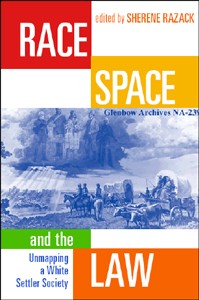Race, Space, and the Law: Unmapping a White Settler SocietyPosted in Anthologies, Books, Campus Life, Canada, History, Law, Media Archive, Native Americans/First Nation, Politics/Public Policy, Religion, Women on 2017-03-06 03:16Z by Steven |
Race, Space, and the Law: Unmapping a White Settler Society
Between The Lines
April 2002
320 pages
Paperback ISBN: 9781896357591
Edited by:
Sherene Razack, Distinguished Professor of Gender Studies
University of California, Los Angeles
Race, Space, and the Law belongs to a growing field of exploration that spans critical geography, sociology, law, education, and critical race and feminist studies. Writers who share this terrain reject the idea that spaces, and the arrangement of bodies in them, emerge naturally over time. Instead, they look at how spaces are created and the role of law in shaping and supporting them. They expose hierarchies that emerge from, and in turn produce, oppressive spatial categories.
The authors’ unmapping takes us through drinking establishments, parks, slums, classrooms, urban spaces of prostitution, parliaments, the main streets of cities, mosques, and the U.S.-Canada and U.S.-Mexico borders. Each example demonstrates that “place,” as a Manitoba Court of Appeal judge concluded after analyzing a section of the Indian Act, “becomes race.”
Contents
- Introduction: When Place Becomes Race / Sherene H. Razack
- Chapter 1: Rewriting Histories of the Land: Colonization and Indigenous Resistance in Eastern Canada / Bonita Lawrence
- Chapter 2: In Between and Out of Place: Mixed-Race Identity, Liquor, and the Law in British Columbia, 1850-1913 / Renisa Mawani
- Chapter 3: Cartographies of Violence: Women, Memory, and the Subject(s) of the “Internment” / Mona Oikawa
- Chapter 4: Keeping the Ivory Tower White: Discourses of Racial Domination / Carol Schick
- Chapter 5: Gendered Racial Violence and Spatialized Justice: The Murder of Pamela George /Sherene H. Razack
- Chapter 6: The Unspeakability of Racism: Mapping Law’s Complicity in Manitoba’s Racialized Spaces / Sheila Dawn Gill
- Chapter 7: Making Space for Mosques: Struggles for Urban Citizenship in Diasporic Toronto / Engin F. Isin and Myer Siemiatycki
- Chapter 8: The Space of Africville: Creating, Regulating, and Remembering the Urban “Slum” / Jennifer J. Nelson
- Chapter 9: Delivering Subjects: Race, Space, and the Emergence of Legalized Midwifery in Ontario / Sheryl Nestel
- Notes
- Bibliography
- Index
- Contributors
